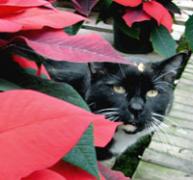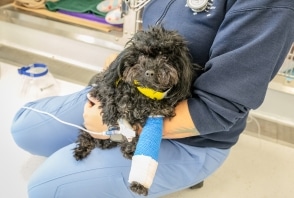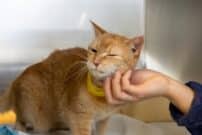Holiday Hazards 2012

Holiday Hazards 2012
The holidays can be fun times for everyone in the family—pets included—but they can also pose dangers to dogs and cats. Here are a few of the holiday-related cases we’ve seen at The Animal Medical Center’s Emergency Service this week.
Tarquin, Gracie and Yoggy snacked from the naughty list
Tarquin, a 5-year-old Cavalier King Charles Spaniel, took advantage of chocolate left within her reach. After consuming most of the bag’s contents while her owners were out, her family returned to find her nauseous and vomiting. A trip to The Animal Medical Center ER resulted in an overnight stay because of a rapid heart rate induced by theobromine, a caffeine-like component of chocolate.
Gracie the Maltese barely tips the scale at 3 pounds. Despite her small stature, she managed to wolf down five dark chocolate truffles. This naughty list indulgence landed her in the hospital getting a treatment of activated charcoal to help bind up any chocolate toxins remaining in her intestinal tract. The darker the chocolate, the higher the concentration of theobromine, and baking chocolate contains the highest concentration. In a dainty dog like Gracie, a few bites of stolen baking chocolate could be fatal.
Yoggy, a young Yorkshire terrier, also ate dark chocolate. His owners discovered him racing around their apartment like a mad man in a chocolate-induced hyperactive state. The ER staff found his blood pressure was elevated too. Yoggy got intravenous fluids and a mild sedative. Lucky for Yoggy, he recovered quickly and was discharged from The AMC the following day.
Other foods on the naughty list include raisins, grapes, onions, and fatty foods. For a yet unknown reason, raisins and grapes cause kidney failure in dogs consuming even just a few. Onions and their relative, garlic, damage the red blood cells of both dogs and cats, resulting in anemia. Fatty foods can induce severe stomach upset or inflammation of the pancreas, so a purloined pork loin should be off your dog’s holiday menu.
Oliver does a mistleno-no
Oliver, a 2-year-old cat, used up one of his nine lives this holiday season when he decided to have a Japanese snow lily salad. These beautiful flowers grace many holiday floral arrangements, but should be avoided in a home with a cat. Ingestion of poinsettia, mistletoe, holly, and cyclamen’s tuberous roots will cause gastrointestinal upset. Some varieties of lilies and amaryllis will cause kidney failure if eaten by your favorite feline. Best to avoid using these in your holiday decorating or you might be spending the holiday with your favorite veterinarian and not with your family!




































